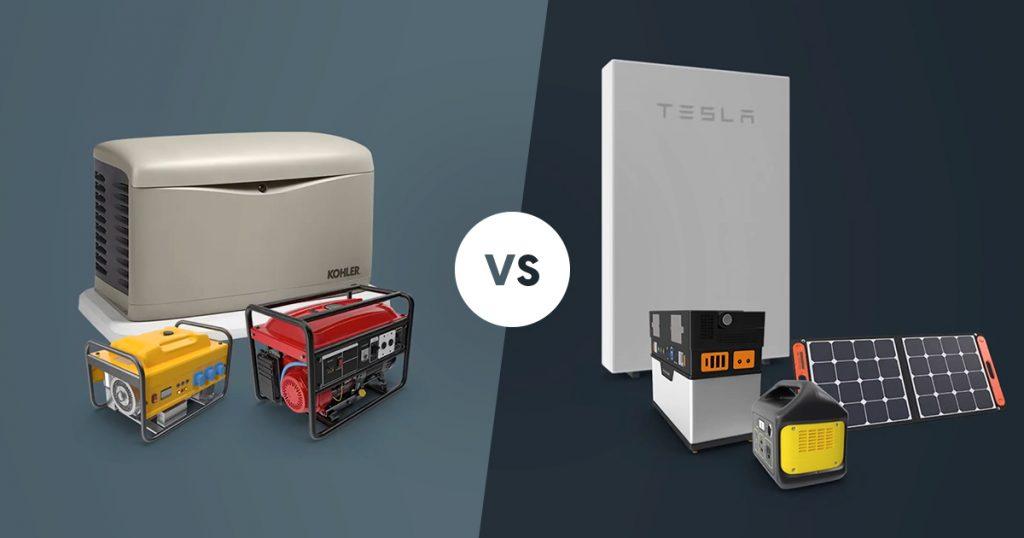Are you grappling with the decision of whether to invest in a generator or rely on batteries for backup power? Today, where uninterrupted electricity is essential for both households and businesses, making the right choice is paramount. When weighing the options of generator vs. battery, it’s crucial to consider factors such as reliability, environmental impact, cost considerations, flexibility, and portability to ensure your backup power solution meets your specific needs and requirements.
Generator vs Battery: Understanding the Basics
Let us set the stage by comparing and contrasting generators and batteries before we get into their nuances.
What is a generator?
When the power goes out or there is no way to connect to the main grid, you can rely on generators, which are mechanical machines that turn the burning of fuel into electricity. They range in size and type from tiny portable ones ideal for outdoor activities to massive fixed ones ideal for supplying electricity to large-scale structures.
Generators operate by burning fuels like gasoline, diesel, natural gas, or propane to drive a motor or turbine, which generates electricity through electromagnetic induction. Equipped with features such as engines, alternators, voltage regulators, and control panels, generators play a crucial role in emergencies, remote locations, construction sites, and outdoor events, ensuring reliable power supply across a wide range of applications.
What is a battery?
An electrochemical device, such as a battery, can store electrical energy chemically and release it when needed. Each of its electrochemical cells has an anode and a cathode, joined by an electrolyte, and the system consists of numerous such cells. When a battery is charged, a chemical reaction occurs at the electrodes, converting electrical energy from an external source into chemical energy, which is stored within the battery.
By passing electrons through an external circuit, electrical devices or systems can be powered when a battery is drained, transforming chemical energy back into electrical energy. Batteries come in various types and sizes, including rechargeable (e.g., lithium-ion, nickel-metal hydride) and non-rechargeable (e.g., alkaline, zinc-carbon), and are widely used in portable electronics, vehicles, renewable energy systems, and backup power applications.
Generator vs. Battery: Which is the Better Backup?
To figure out which is a more reliable backup between the generator and battery, let the following perspective enlighten you:
Reliability and Dependability: Ensuring Continuous Power
When it comes to reliability, generators have long been the go-to solution, known for their robustness and ability to provide consistent power over extended periods. When power goes off for an extended period of time, generators become quite important since they keep the power on when it’s needed most.
However, batteries, with advancements like high-capacity lithium-ion technology, are closing the credibility gap. While they may not match generators in sustaining power for as long, especially during extended blackouts, modern batteries offer a reliable alternative, particularly for shorter backup needs.
Fuel Source and Environmental Impact: Making Sustainable Choices
Considering the fuel source and environmental impact is crucial in the generator vs. battery debate. Generators typically rely on fossil fuels like gasoline or diesel, contributing to air pollution and emitting greenhouse gases. Additionally, fuel storage and handling pose logistical challenges and safety hazards.
On the flip side, batteries, especially those powered by renewable sources like solar or wind, present a greener option. With zero emissions during operation and the ability to recharge using clean energy, batteries offer a significantly lower environmental footprint, aligning with sustainable energy goals.
Cost Considerations: Balancing Upfront Investment with Long-Term Expenses
Looking beyond the initial investment, the cost analysis of generators vs. battery backup systems is essential. While generators may entail a higher upfront cost, especially for whole-house standby units, they often boast lower ongoing maintenance expenses and can provide reliable power for decades with proper care.
Batteries, on the other hand, may offer a lower initial investment but require periodic replacement and maintenance, leading to long-term cost accumulation. To make a financially prudent selection, it is necessary to carefully analyze both the upfront and long-term expenses.
Flexibility and Portability: Tailoring Solutions to Your Needs
Batteries hold a clear advantage in terms of flexibility and portability. With various sizes and configurations available, from compact portable units to large-scale systems, batteries offer users the flexibility to tailor their backup power solution according to specific needs and budget constraints.
In contrast, while generators offer unmatched power and reliability, they are often bulky and stationary, limiting their mobility and adaptability in certain scenarios. The choice between generators and batteries ultimately depends on the level of flexibility and portability required for your particular application.
Application and Use Cases: Matching Solutions to Scenarios
Ultimately, the decision between generators and battery backup systems hinges on the specific application and use cases. Generators excel in scenarios where continuous, high-capacity power is essential, such as powering essential appliances during prolonged outages or running heavy-duty equipment on job sites.
On the other hand, batteries shine in situations where quiet operation, clean energy, and portability are paramount, such as camping trips, RV adventures, or off-grid living arrangements. By understanding the unique requirements of each scenario, you can confidently choose the right solution to meet your power needs.
Generator vs. Battery Backup? Which suits your home needs?
The decision between generators and battery backup systems for your home is multifaceted and highly dependent on your specific requirements, preferences, and budget constraints. Generators offer unparalleled reliability, robustness, and high capacity, making them indispensable for prolonged outages and heavy-duty applications. Conversely, batteries provide flexibility, portability, and environmental sustainability, making them an attractive option for recreational use, off-grid living, and small-scale backup power. By carefully weighing the pros and cons of each option and considering your unique circumstances, you can confidently choose the right solution to ensure uninterrupted power supply when you need it most.
